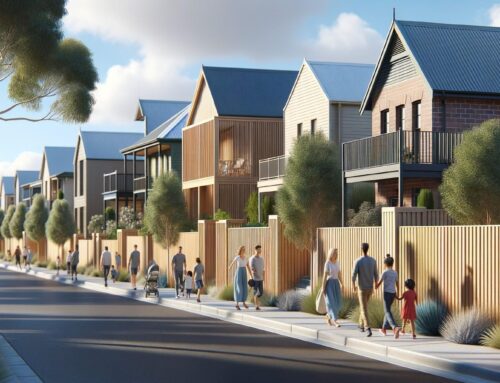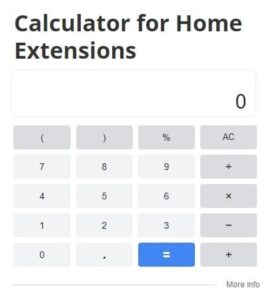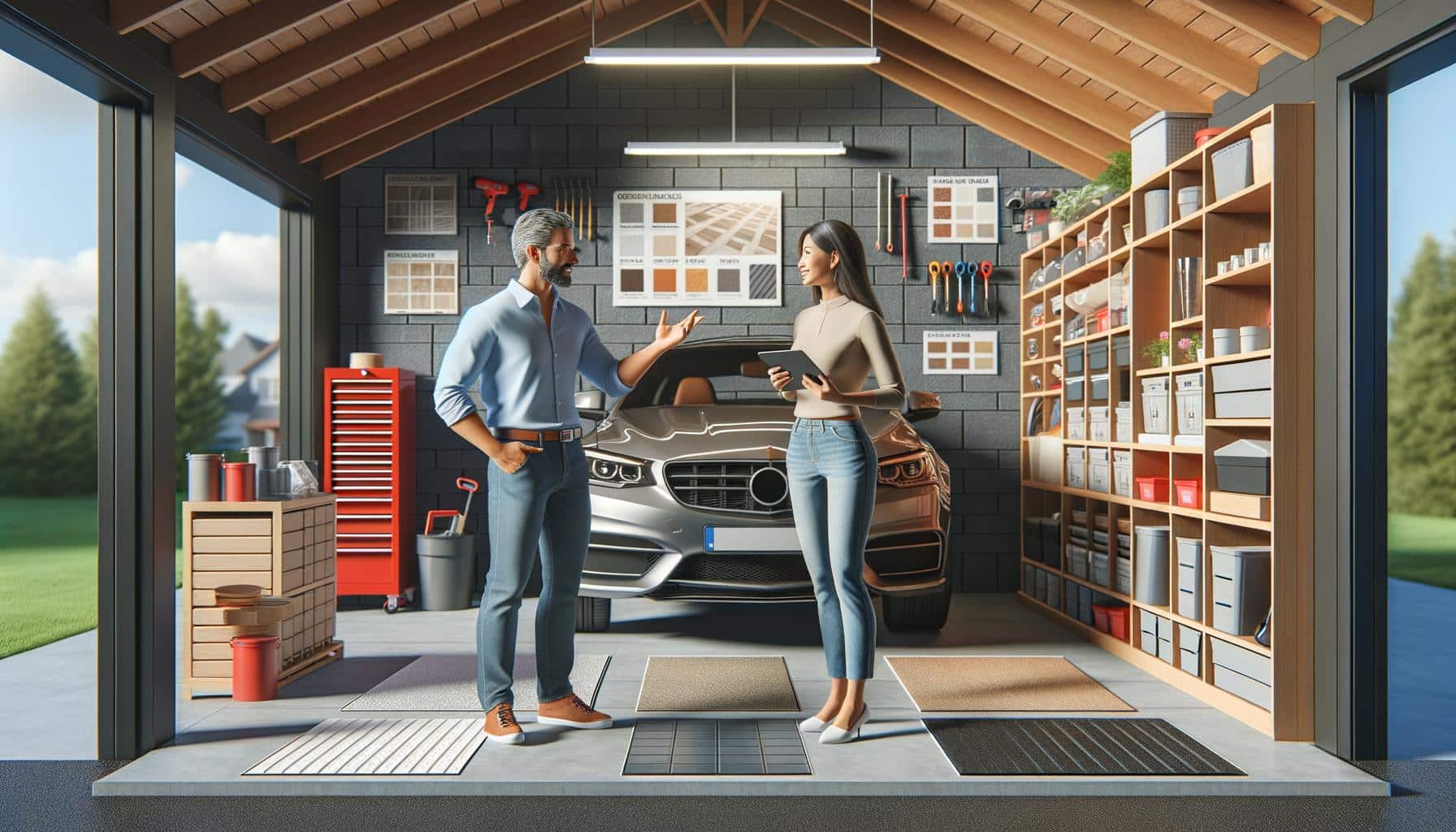
At Home Owners Association, we understand the importance of a well-maintained garage floor. It’s not just about aesthetics; it’s about functionality and durability too.
Choosing the right garage floor covering can transform your space, protect against stains and damage, and even increase your home’s value. In this post, we’ll explore the best garage floor covering options to help you make an informed decision for your home.
Why Epoxy Is the Top Choice for Your Garage Floor
Understanding Epoxy Coatings
Epoxy coatings have revolutionized garage floor treatments. This two-part system combines resin and hardener to create a tough, plastic-like material. When applied, it forms a strong bond with concrete surfaces, resulting in a seamless and durable finish.
The application process requires thorough cleaning and preparation of the concrete surface before the epoxy mixture is applied. Full curing typically takes 24 to 72 hours, depending on the specific product and environmental conditions.
Unmatched Durability and Longevity
Durability stands out as a primary advantage of epoxy coatings. These floors withstand heavy traffic, resist oil and chemical spills, and can last for decades with proper care. Epoxy flooring is not only durable and cost-effective but also an eco-friendly choice for homes and businesses. Its longevity and low maintenance contribute to its long-term value.
Aesthetic Versatility
Epoxy coatings offer an impressive range of aesthetic options. You can select from solid colors, metallic effects, or add decorative flakes for a custom look. This versatility allows you to create a garage floor that complements your home’s style perfectly.
Simple Maintenance for Long-lasting Beauty
Maintaining an epoxy floor doesn’t require complex procedures. Regular sweeping and occasional mopping with a mild detergent will keep it looking pristine. For stubborn stains, a soft-bristled brush and warm water often suffice.
While epoxy boasts high durability, it’s not indestructible. Avoid dragging heavy objects across the surface and clean spills promptly to prevent staining. Address any chips or cracks quickly to prevent further damage.
Cost-Effective Investment
The cost of epoxy flooring varies based on factors such as garage size and epoxy quality. Professional installation in Australia typically ranges from $3 to $12 per square foot. Although this initial cost may seem higher than some alternatives, the long-term durability and low maintenance requirements often make it a cost-effective choice over time.
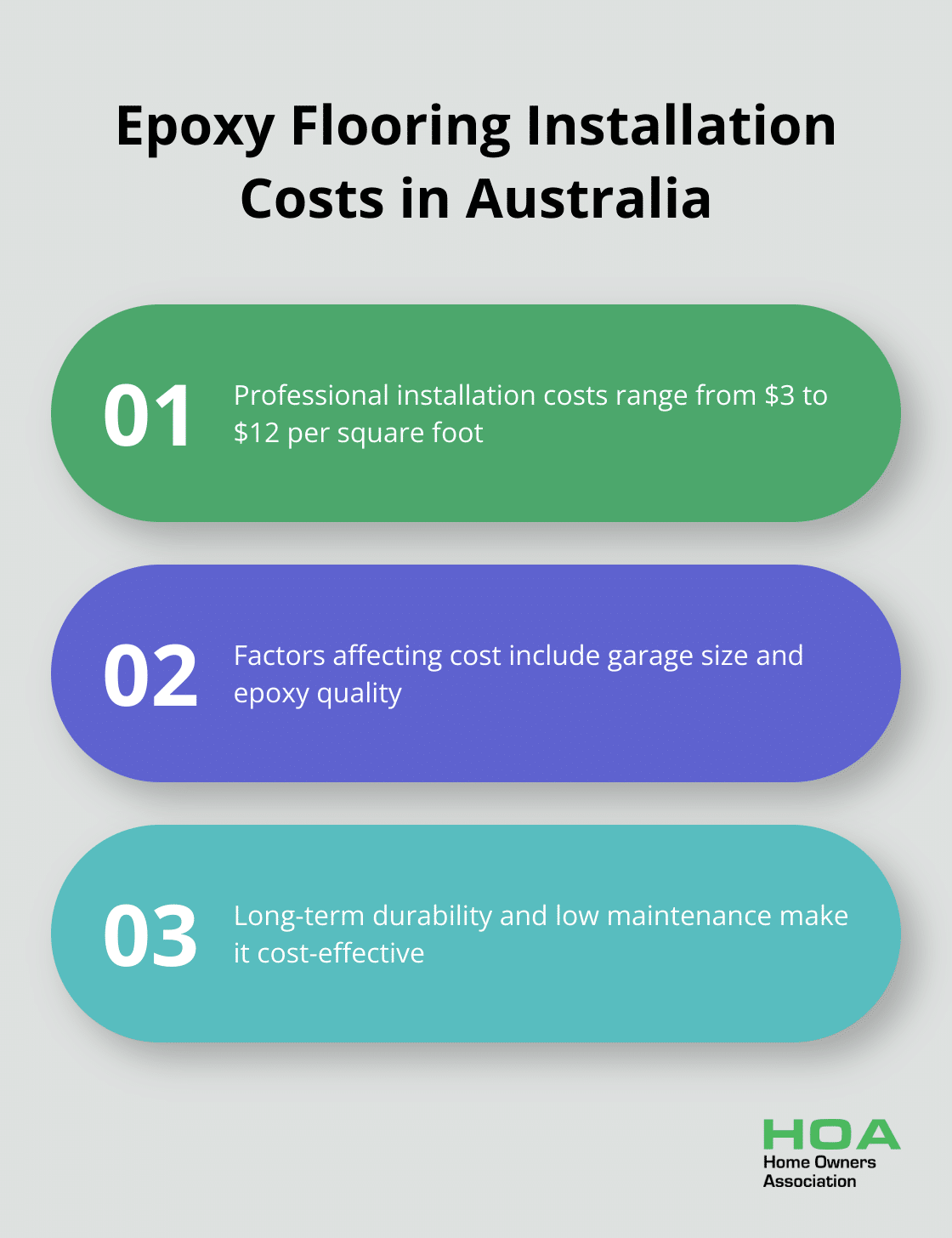
As we move on to explore interlocking tiles, another popular garage flooring option, it’s worth noting that while epoxy sets a high standard, each flooring solution offers unique benefits to suit different needs and preferences.
Are Interlocking Tiles Right for Your Garage?
Types of Interlocking Tiles
Interlocking tiles offer a practical and versatile solution for garage flooring. These tiles come in various materials, including PVC, polypropylene, and rubber, each with unique properties suited to different garage needs.
PVC tiles are lightweight and resist most chemicals, making them ideal for garages prone to spills. Polypropylene tiles offer excellent durability and can withstand heavy vehicle traffic. Rubber tiles provide superior shock absorption and noise reduction, perfect for garages doubling as workshops.
Cost Considerations
The average cost of interlocking tiles in Australia ranges from $5 to $15 per square foot, depending on the material and quality. While this may seem higher than some options, their longevity and easy replacement of individual tiles often result in lower long-term costs.
Easy Installation Process
One of the biggest advantages of interlocking tiles is their straightforward installation process. Most homeowners can complete the installation themselves in a weekend, saving on professional installation costs. The tiles simply click together, requiring no adhesives or special tools.
For a standard single-car garage (about 20 square meters), installation typically takes 4-6 hours. This quick turnaround means minimal disruption to your daily routine.
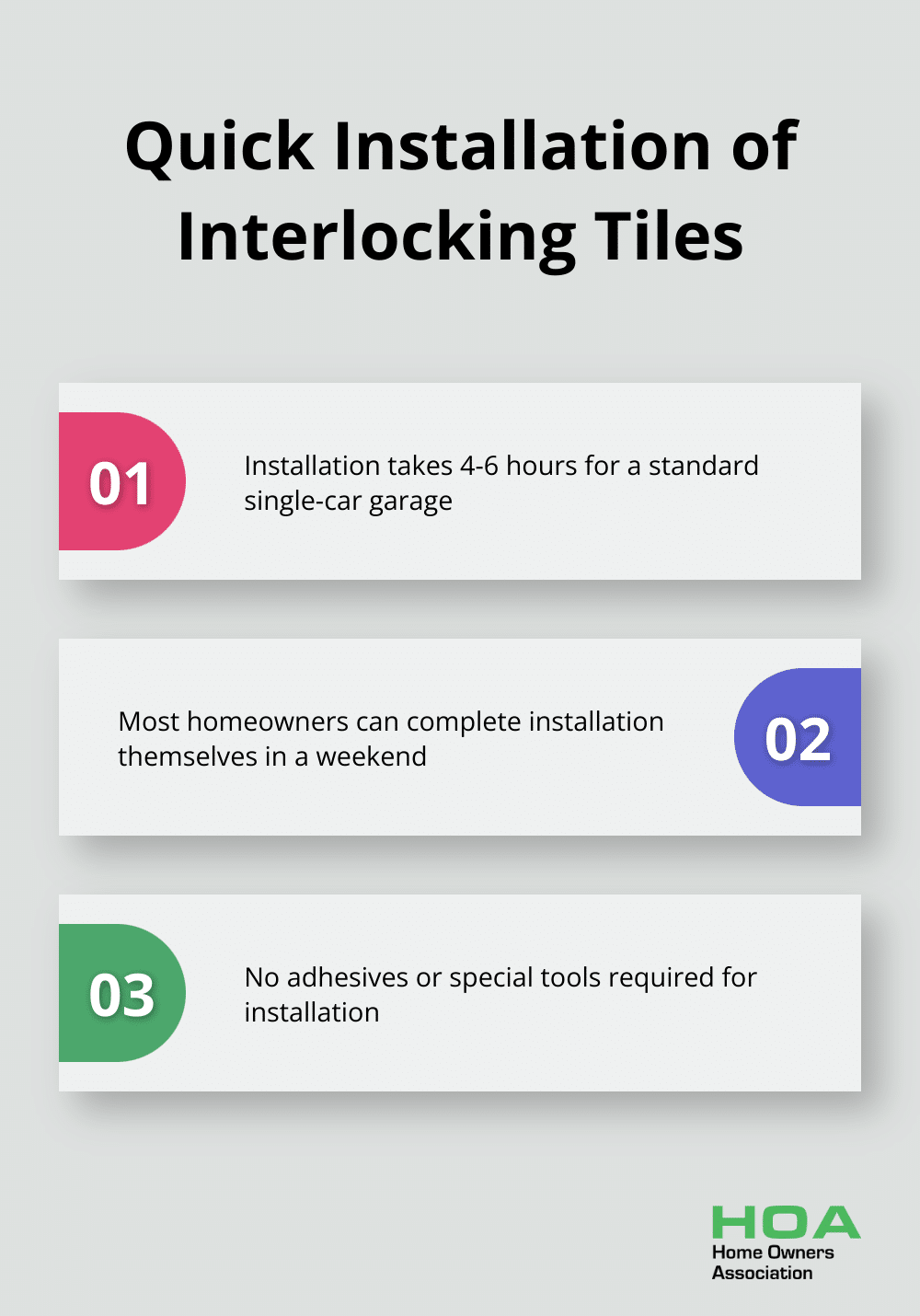
Customization Options
Interlocking tiles offer extensive customization possibilities. You can create patterns, incorporate multiple colors, or even design logos. This flexibility allows you to match your garage floor to your home’s aesthetic or create a unique space that reflects your personality.
Many homeowners report increased satisfaction with their garage spaces after installing custom-designed interlocking tile floors. The ability to easily change or update the design over time is an added bonus that many appreciate.
Maintenance and Longevity
Maintaining interlocking tiles is straightforward. Regular sweeping and occasional mopping with a mild detergent are usually sufficient. For tougher stains, you can use a soft-bristled brush without damaging the tiles.
Garage floor tiles are resistant to stains, spills, and chemicals, making them easy to clean and maintain. They provide a comfortable surface to work on and can last for many years with proper care.
While interlocking tiles offer numerous benefits, they may not suit all garages. Homes in areas with significant temperature fluctuations might experience some expansion and contraction of the tiles. Additionally, in garages with moisture issues, some tile types may not provide adequate protection against water damage to the underlying concrete.
As we move on to explore polyaspartic coatings, it’s important to consider how these fast-curing and chemical-resistant options compare to the versatility of interlocking tiles for your garage flooring needs.
Why Polyaspartic Coatings Are Gaining Popularity
The Speed Advantage of Polyaspartic Coatings
Polyaspartic coatings have become a top choice for garage floors in Australia. These innovative coatings offer a unique combination of fast curing times and exceptional chemical resistance, making them an attractive option for homeowners who seek durable and low-maintenance flooring solutions.
One of the most significant benefits of polyaspartic coatings is their rapid curing time. Unlike epoxy coatings that can take up to 24 hours to cure fully, polyaspartic cure times range anywhere from 20 minutes to an hour. This quick turnaround means less disruption to your daily routine and faster project completion.
A study conducted by the Australian Coating Manufacturers Association found that polyaspartic coatings can reduce garage floor installation time by up to 60% compared to traditional epoxy systems. This time-saving feature is particularly valuable for busy households or commercial spaces where downtime needs to be minimized.
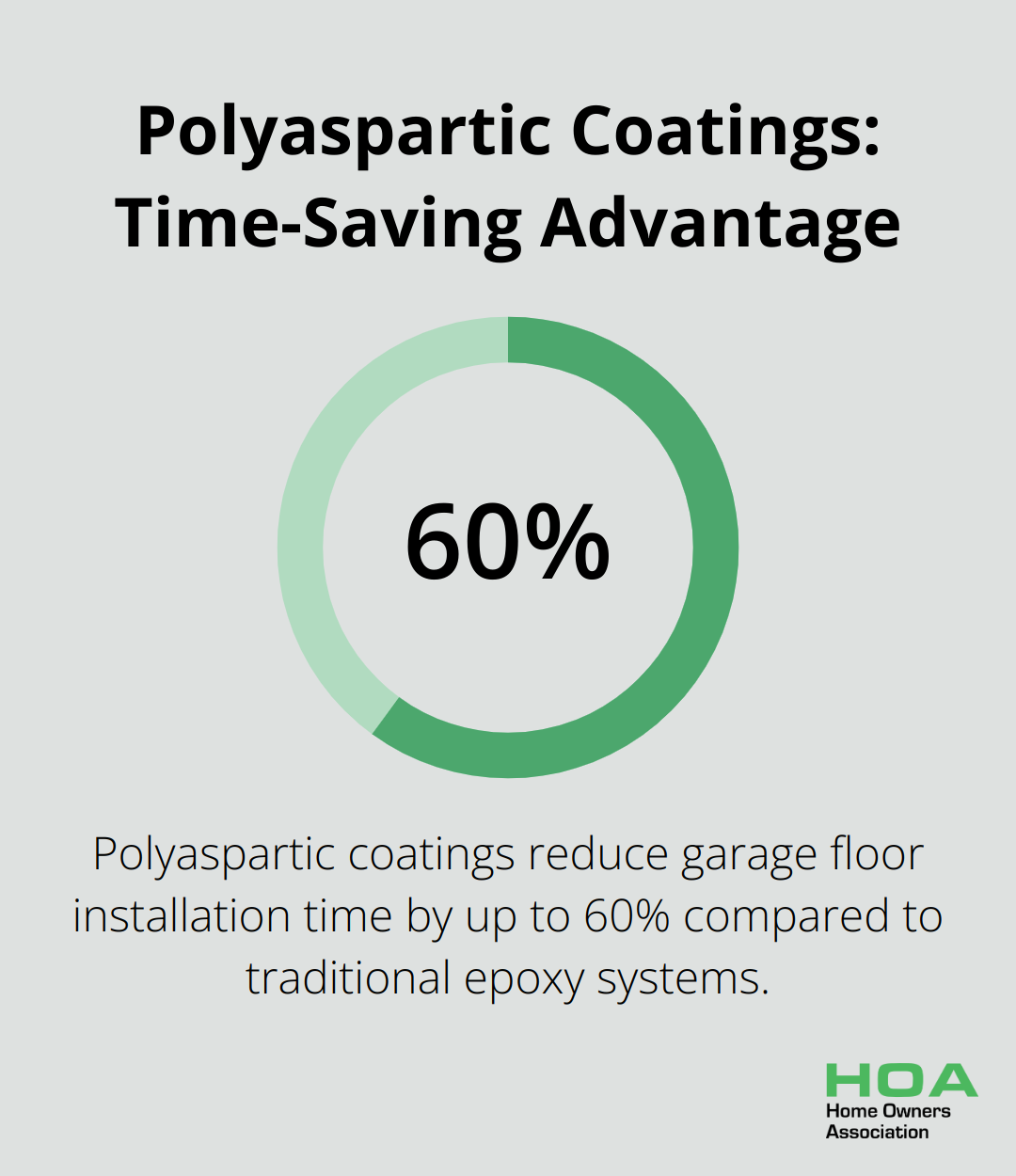
Superior Chemical Resistance for Long-lasting Protection
Polyaspartic coatings excel in their ability to resist a wide range of chemicals, including automotive fluids, household cleaners, and even harsh industrial solvents. This high level of chemical resistance ensures that your garage floor remains protected against spills and stains for years to come.
Tests performed by the CSIRO (Commonwealth Scientific and Industrial Research Organisation) have shown that polyaspartic coatings can withstand exposure to common garage chemicals for extended periods without showing signs of degradation. This level of protection far surpasses that of standard epoxy coatings, which may begin to show wear after just 24 hours of chemical exposure.
Application Process and Durability Considerations
The application process of polyaspartic coatings requires precision and expertise. The fast-curing nature of these coatings means that they must be applied quickly and accurately. For this reason, professional installation (which ensures the best results) is recommended.
The durability of polyaspartic coatings is impressive, with many manufacturers offering warranties of up to 15 years. This longevity is attributed to their high abrasion resistance and UV stability. According to data from the Australian Building Codes Board, polyaspartic coatings can withstand up to 50% more foot traffic than standard epoxy coatings before showing signs of wear.
Cost Considerations
When you consider polyaspartic coatings for your garage floor, it’s important to factor in the initial cost. While they may be more expensive than some alternatives, their long-term durability and low maintenance requirements often result in cost savings over time. On average, polyaspartic coatings in Australia cost between $10 to $18 per square foot, depending on the specific product and installation requirements.
Aesthetic Options
Polyaspartic coatings offer a range of aesthetic options to suit various preferences. You can choose from solid colors, metallic finishes, or even add decorative flakes for a custom look. This versatility allows you to create a garage floor that complements your home’s style perfectly.
Final Thoughts
The right garage floor covering can transform your space. Epoxy coatings, interlocking tiles, and polyaspartic coatings each offer unique advantages for different needs and preferences. Your choice should align with your specific requirements, budget, and long-term goals for your garage space.
Proper maintenance will extend the life of your chosen garage floor covering. Regular cleaning, quick spill clean-up, and prompt repair of any damage will preserve your floor’s appearance and functionality. These practices (along with selecting the right covering) will create a more appealing and functional garage.
For personalized advice on garage floor covering options and access to trade pricing on materials in Melbourne, join the Home Owners Association. We support informed decisions and successful home improvement outcomes. Our team can help you navigate the selection process and find the best solution for your garage.



